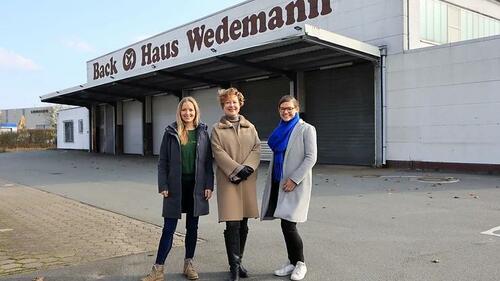
The bioeconomy startup traceless has announced the location for its first production plant in Hamburg-Harburg, taking over an existing building from a traditional bakery. The founders aim to focus on resource-conserving construction and provide fresh impetus for a green, bio-based industry locally. With a planned annual production volume of several thousand tons of traceless granulate, the company aims to start production in 2025. The material is a natural plastic substitute made from plant-based agricultural waste, which is home-compostable and saves 91% CO2 emissions compared to plastic. The company plans to create around forty new jobs and shape the region as a hub for innovation in the bioeconomy.
Hamburg - The bioeconomy startup traceless today announced the location for its first production plant. The material pioneer's first large-scale production facility will be located at Großmoorbogen in Hamburg-Harburg. The founders and their team are taking over the existing building from the previous owner, the traditional bakery Wedemann. In doing so, traceless is focusing on resource-conserving construction in existing buildings.
Anne Lamp, traceless' co-founder and CEO, commented: "This location is a real stroke of luck for us. We are delighted that we can now build our first large production facility here in Hamburg - this is where we founded traceless and took our first steps out of science. We are delighted that the previous owner, Franziska Wedemann, agreed to sell the building to a young company like us. As pioneers, we want to provide fresh impetus for a green, bio-based industry here locally and hope to attract many more companies."
Johanna Baare, traceless' co-founder and COO, added: "After we were able to announce the financing last September, we can now finally start construction. An exciting phase is beginning for us here in Harburg. The demo plant is the first step towards industrializing our technology. Here we want to show that we can actually produce our material on a large scale and competitively. This step is essential for our goal of making a real difference in solving plastic pollution."
Until 2022, the site was home to the long-established Wedemann bakery. Franziska Wedemann, Chairwoman of the Wirtschaftsverein für den Hamburger Süden e.V. and former Managing Partner of Backhaus Wedemann, commented positively on the handover: "When this production site started operations in 1981, it was one of the most modern and energy-efficient bakeries. The closure of this site marks the end of a 130-year history of a successful family business. With Traceless, a new great and forward-looking company will write its own history at this location. I am delighted about this and wish the two founders and their team every success!"
The building for the new production plant covers an area of around 4,000 square meters. An annual production volume of several thousand tons of traceless granulate is planned, with production set to start in 2025. For the first regular market entry, traceless has already concluded initial purchase agreements with European brand owners and processors. The successful EUR 36.6 million financing round for the construction of the plant was announced in September 2023. Various investors and a local banking consortium are involved. The project is being funded with EUR 5,128,401 from the Environmental Innovation Program of the Federal Ministry for the Environment, Nature Conservation, Nuclear Safety and Consumer Protection (BMUV).
With the expansion of the production team to around 90 people, traceless will create around forty new jobs in the current and coming year and attract qualified industrial workers. By locating in the south of Hamburg, traceless aims to shape the region as a location for innovation, provide an impetus for the development of a bio-based industry and decisively advance the bioeconomy in Germany.
The traceless material is a natural plastic substitute made from plant-based agricultural waste. The new material is naturally regenerative and certified plastic-free, bio-based and home-compostable. The resource-saving process saves 91% CO2 emissions in production and disposal compared to plastic. The company produces the material in the form of granulate, which can be further processed into cast parts, flexible films or coatings using standard processing technologies. The material can replace plastic in products that are difficult to recycle or easily end up in the environment - from disposable products to rigid and flexible packaging to paper and cardboard coatings.